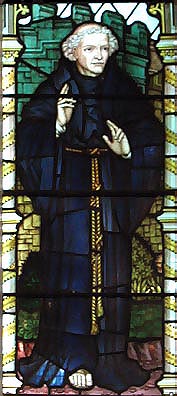 |
 |
|||
|
|
Geoffrey is traditionally said to have been a
Welshman, born somewhere in the region of Monmouth around 1100, though one
or both of his parents may have come from Brittany. His father's name
was apparently Arthur, a man who would perhaps have told his son stories
of his Royal namesake from an early age. Local tradition makes Geoffrey a Benedictine
monk at Monmouth Priory, if not the actual prior. However, this seems to
be due to a misidentification with his contemporary, Prior Geoffrey the
Short of Monmouth. Certainly 'Geoffrey's Window' at which he is said
to have sat and written his famous works and 'Geoffrey's Study' used
as a schoolroom within the Priory Gatehouse are only of late 15th century
date. At most it seems that Geoffrey might perhaps have been educated at
Monmouth Priory. Some say, erroneously, that his tutor was an uncle named
Uchtryd who made him Archdeacon of Llandeilo or Llandaff when he became
Bishop of the latter in around 1140. A variety of obscure medieval records give
only glimpses of the man's real life. By his late twenties, Geoffrey
certainly seems to have travelled eastwards to become a secular Austin
canon at the Collegiate Church of St. George at the castle in
Oxford. He
was a member of the college community there, and a tutor of some kind, for
at least the next twenty years - witnessing a number of charters during
his residence - but he turned to writing not long after his arrival. The
'Prophecies of Merlin' appear
to have been a series of ancient Celtic prophecies which, at the request
of Alexander of Salisbury, Bishop of Lincoln, Geoffrey translated
into Latin, perhaps with some additions of his own. Whether they
had previously been attributed to the Northern British bard,
Myrddin, is unknown. As with all his works, Geoffrey hoped
the prophecies might bring him a lucrative preferment in the Church, and
he used its dedication to ingratiate himself with Alexander who was Bishop
of his local diocese. Geoffrey made a more appreciative acquaintance while
at St. George's, in the person of Walter the Provost, who was also
Archdeacon of the city. In his writings, Geoffrey tells us that Walter
gave him "a certain very ancient book written in the British language"
and, probably because he was unable to read Welsh (or Breton) himself, the
Archdeacon encouraged Geoffrey to translate it into Latin. So, in about 1136, the Welshman
set about writing his 'History of the Kings of Britain' dedicated to Robert,
Earl of Gloucester, and Waleran, Count of Mellent. Whether this was a
straight translation of an 'ancient book' or contained considerable
embellishments, if not worse, from Geoffrey himself has been the subject
of heated debate for many generations. At the time, the work was taken at
face value and accepted by most as a true history of the Welsh nation from
around 1100 bc to around AD 689. Merlin appeared again, as an advisor to
Kings Ambrosius and
Uther, but the work was most
notable for its extensive chapters covering the reign of the great
King Arthur. Since the 17th century,
however, its author has been largely vilified as an inexorable
forger who made up his stories "from an inordinate love of lying".
Modern historians tend to be slightly more sympathetic. Parts of Geoffrey's
work certainly seem to have their origins in ancient Celtic mythology,
others could have come from works by authors such as Gildas, Nennius, Bede
and also the Mabinogion. But there are also hints that he had access to at
least one other work unknown to us today. His 'King Tenvantius of
Britain,' for example, was otherwise unknown to historians until
archaeologists began to uncover Iron Age coins struck for a tribal leader
in Hertfordshire named Tasciovantus. Some people consider the several
copies of a Welsh version of Geoffrey known as the 'Brut y Brenhinedd'
to be his original 'ancient book'. However, the 'Chronicle of Saint
Brieuc' makes reference to several of Geoffrey's characters apparently
from a source called the 'Ystoria Britannica'. At the end of 1150,
Geoffrey appears to have come into the possession of further source
documents concerning the life-story of his original subject, the bard,
Myrddin (alias Merlin). Unfortunately, these did not line up terribly
well the information he had given about this man in his 'History of
the Kings of Britain' - perhaps indicating that this part was either
invented or, more probably, that Merlin's name had been rather
over-eagerly attributed to an otherwise unknown Royal adviser. Keen
to put across the true story, without losing face, Geoffrey wrote
the 'Life of Merlin,' correctly placing its events after the reign
of Arthur, but thus giving his title role an impossibly long lifespan.
It was dedicated to his former colleague at St. George's, Robert De
Chesney, the new Bishop of Lincoln. The following year, Geoffrey's sycophancy
at last paid off. He was elected Bishop of St. Asaphs, for good service to
his Norman masters; and was consecrated by Archbishop Theobald at Lambeth
Palace in February 1152. As a Welsh-speaker, he was probably chosen in an
attempt to make the diocesanal administration more acceptable in an age
when Normans were not at all popular in the areas of Wales which they
controlled. However, the strategy seems to have been unsuccessful. Owain
Gwynedd's open rebellion was in full swing and Geoffrey appears to have
never even visited his bishopric. He died four years later, probably in
London.
|
|||
| © Nash Ford Publishing 2003. All Rights Reserved. | ||||





 GEOFFREY OF MONMOUTH
GEOFFREY OF MONMOUTH